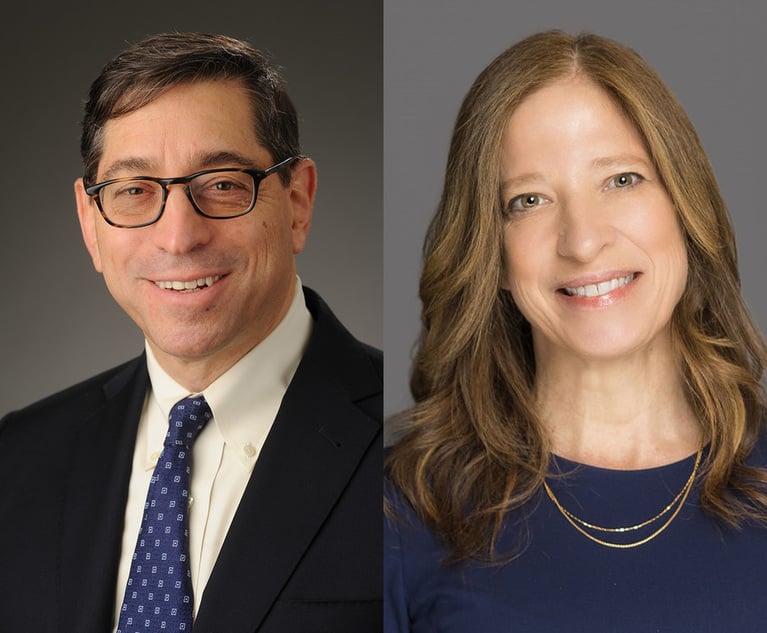Navigating Cross-Border Criminal Enforcement and 'Allen'
The right not to testify against oneself in an American courtroom is absolute. But what if the testimony was compelled by a foreign government following its own laws?
December 28, 2017 at 05:41 PM
5 minute read

The right not to testify against oneself in an American courtroom is absolute. What if, however, the testimony offered was compelled not by a U.S.-based prosecutor, but by a foreign government following its own laws? According to the U.S. Court of Appeals for the Second Circuit decision in United States v. Allen, the rule remains the same: The Fifth Amendment's prohibition on the use of compelled testimony in American criminal proceedings applies even when a foreign sovereign has compelled the testimony. The government's petition to rehear the case by the full Second Circuit panel was recently denied, which means the decision stands—for now.
Viewed practically, this decision exposes American prosecutors to a difficult trilemma: cease reliance on foreign criminal enforcement altogether; accept the risk that foreign evidence may endanger complex white-collar prosecutions; or seek to calibrate foreign enforcement to American investigatory standards.
The case is just one example of the challenges arising from the increasing interdependence of international enforcement agencies, which are working together more frequently and wrestling with different procedures and individual protections as a result.
In this case, U.K. and U.S. authorities investigated defendants Anthony Allen and Anthony Conti for their role in illegally manipulating Rabobank's Libor submissions. During the investigation, the U.K. Financial Conduct Authority (FCA) compelled Allen and Conti to reply to investigative questions.
The FCA eventually charged another Rabobank employee—Paul Robson—and allowed Robson to review and take notes of the evidence against him, including Allen's and Conti's compelled testimony. Shortly thereafter, however, the FCA dropped its case against Robson, but the U.S. Department of Justice pursued the matter—securing Robson's plea and cooperation and indicting Allen and Conti. Armed with what he learned by reviewing Allen's and Conti's compelled statements, Robson provided key evidence to both the grand jury that indicted Allen and Conti, and to the petit jury that convicted them. Critically, statements Robson made before he reviewed Conti's and Allen's compelled statements materially differed from his later testimony in the United States.
The Second Circuit held that testimony compelled by a foreign sovereign and used in a U.S. criminal prosecution implicates the Fifth Amendment. In doing so, the court made three key observations: First, unlike violations of the Fourth Amendment that are fully accomplished at the time an unreasonable governmental intrusion occurs, a violation of the Fifth Amendment's right against self-incrimination does not occur when a statement is compelled but rather when a compelled statement is offered at trial against the defendant.
The Fourth Amendment exclusionary rule, on the other hand, is a judge-made remedy put in place to deter law enforcement from committing Fourth Amendment violations. Such exclusionary rules will have no effect on foreign law enforcement conduct, and therefore American courts will not apply our Fourth Amendment jurisprudence to foreign authorities. Second, when it comes to compelled testimony, foreign governments are not on the same footing as private employers. The court noted that “only sovereign power exposes those suspected of crime to the cruel trilemma of self-accusation, perjury or contempt.”
Only the U.K. government could have immunized the defendants, compelling them to testify or go to jail. Compulsion by foreign sovereigns is cognizable by the Fifth Amendment. Compulsion by private employers is not.
Finally, the court noted that the “same sovereign” principle, whereby the Fifth Amendment protections apply only if the same sovereign compelled and used the testimony, is inapplicable. While the principle may still apply in unique circumstances, the court held that it does not alter the conclusion that “the Fifth Amendment is a personal trial right—one violated only at the time of 'use' rather than at the time of 'compulsion.'”
Allen's implications go to the heart of how prosecutors conduct international investigations. As the Second Circuit noted, “collaboration and coordination among multiple regulators in cross-border matters is the future of major white collar criminal enforcement.” This is increasingly true as we rely more on technology and connectivity and less on artificial borders.
The message post-Allen is clear: American prosecutors must account for the risk of any error in such coordination, since the government—as opposed to the subjects and targets of cross-border investigations—will bear the costs of any such mistakes.
While in the short-term Allen will complicate U.S.-based efforts to build cases that rely on foreign evidence and may briefly slow the prosecution of criminal conduct that crosses international borders and implicates compelled testimony, in the longer term, Allen will propel U.S. prosecutors and willing foreign authorities to increase and improve their coordinated enforcement efforts. As Allen noted, this is already taking place as American authorities are embedding their own prosecutors in various foreign law enforcement agencies. Time will tell what the precise results of such increased cooperation will be. One result is clear: In any coordinated, cross-border investigation, if the United States wants to expose overseas suspects to the U.S. criminal justice system, the lessons and protections of Allen will need to remain front and center.
Paul Rosen, a partner in Crowell & Moring's white-collar and regulatory enforcement group, is the former chief of staff for the U.S. Department of Homeland Security. Nimrod Haim Aviad, counsel in the group, represents corporate and individual clients. Danielle Rowan is an associate with the firm.
This content has been archived. It is available through our partners, LexisNexis® and Bloomberg Law.
To view this content, please continue to their sites.
Not a Lexis Subscriber?
Subscribe Now
Not a Bloomberg Law Subscriber?
Subscribe Now
NOT FOR REPRINT
© 2025 ALM Global, LLC, All Rights Reserved. Request academic re-use from www.copyright.com. All other uses, submit a request to [email protected]. For more information visit Asset & Logo Licensing.
You Might Like
View All
New York Mayor Adams Attacks Fed Prosecutor's Independence, Appeals to Trump
5 minute read

The Marble Palace Blog: Supreme Court Books You Should Read in 2025
Trending Stories
- 1No Two Wildfires Alike: Lawyers Take Different Legal Strategies in California
- 2Poop-Themed Dog Toy OK as Parody, but Still Tarnished Jack Daniel’s Brand, Court Says
- 3Meet the New President of NY's Association of Trial Court Jurists
- 4Lawyers' Phones Are Ringing: What Should Employers Do If ICE Raids Their Business?
- 5Freshfields Hires Ex-SEC Corporate Finance Director in Silicon Valley
Who Got The Work
J. Brugh Lower of Gibbons has entered an appearance for industrial equipment supplier Devco Corporation in a pending trademark infringement lawsuit. The suit, accusing the defendant of selling knock-off Graco products, was filed Dec. 18 in New Jersey District Court by Rivkin Radler on behalf of Graco Inc. and Graco Minnesota. The case, assigned to U.S. District Judge Zahid N. Quraishi, is 3:24-cv-11294, Graco Inc. et al v. Devco Corporation.
Who Got The Work
Rebecca Maller-Stein and Kent A. Yalowitz of Arnold & Porter Kaye Scholer have entered their appearances for Hanaco Venture Capital and its executives, Lior Prosor and David Frankel, in a pending securities lawsuit. The action, filed on Dec. 24 in New York Southern District Court by Zell, Aron & Co. on behalf of Goldeneye Advisors, accuses the defendants of negligently and fraudulently managing the plaintiff's $1 million investment. The case, assigned to U.S. District Judge Vernon S. Broderick, is 1:24-cv-09918, Goldeneye Advisors, LLC v. Hanaco Venture Capital, Ltd. et al.
Who Got The Work
Attorneys from A&O Shearman has stepped in as defense counsel for Toronto-Dominion Bank and other defendants in a pending securities class action. The suit, filed Dec. 11 in New York Southern District Court by Bleichmar Fonti & Auld, accuses the defendants of concealing the bank's 'pervasive' deficiencies in regards to its compliance with the Bank Secrecy Act and the quality of its anti-money laundering controls. The case, assigned to U.S. District Judge Arun Subramanian, is 1:24-cv-09445, Gonzalez v. The Toronto-Dominion Bank et al.
Who Got The Work
Crown Castle International, a Pennsylvania company providing shared communications infrastructure, has turned to Luke D. Wolf of Gordon Rees Scully Mansukhani to fend off a pending breach-of-contract lawsuit. The court action, filed Nov. 25 in Michigan Eastern District Court by Hooper Hathaway PC on behalf of The Town Residences LLC, accuses Crown Castle of failing to transfer approximately $30,000 in utility payments from T-Mobile in breach of a roof-top lease and assignment agreement. The case, assigned to U.S. District Judge Susan K. Declercq, is 2:24-cv-13131, The Town Residences LLC v. T-Mobile US, Inc. et al.
Who Got The Work
Wilfred P. Coronato and Daniel M. Schwartz of McCarter & English have stepped in as defense counsel to Electrolux Home Products Inc. in a pending product liability lawsuit. The court action, filed Nov. 26 in New York Eastern District Court by Poulos Lopiccolo PC and Nagel Rice LLP on behalf of David Stern, alleges that the defendant's refrigerators’ drawers and shelving repeatedly break and fall apart within months after purchase. The case, assigned to U.S. District Judge Joan M. Azrack, is 2:24-cv-08204, Stern v. Electrolux Home Products, Inc.
Featured Firms
Law Offices of Gary Martin Hays & Associates, P.C.
(470) 294-1674
Law Offices of Mark E. Salomone
(857) 444-6468
Smith & Hassler
(713) 739-1250











